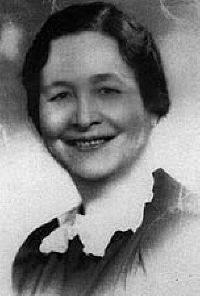Ella Cara Deloria | |
|---|---|
| Aŋpétu Wašté Wiŋ, "Beautiful Day Woman" | |
 | |
| Born | January 31, 1889 White Swan district of the Yankton Indian Reservation, South Dakota |
| Died | February 12, 1971 (aged 82) |
| Education | Educated at her father's mission school and All Saints Boarding School |
| Alma mater | Oberlin College; B.Sc., Teachers College, Columbia University, 1915 |
| Occupation(s) | Educator, anthropologist, ethnographer, linguist, and novelist |
| Known for | Recording Sioux oral history and legends; 1940 novel Waterlily; fluent in Dakota, Lakota, and Nakota dialects of Sioux, and Latin.[1] |
| Parent(s) | Mary (Miriam) Sully Bordeaux Deloria and Philip Joseph Deloria |
| Relatives | Sister Susan Deloria; brother Vine Victor Deloria, Sr.; Nephew Vine Deloria, Jr. |
| Awards | Indian Achievement Award, 1943; Ella C. Deloria Undergraduate Research Fellowship established in her honor |
Ella Cara Deloria (January 31, 1889 – February 12, 1971), also called Aŋpétu Wašté Wiŋ (Beautiful Day Woman), was a Yankton Dakota (Sioux) educator, anthropologist, ethnographer, linguist, and novelist. She recorded Native American oral history and contributed to the study of Native American languages.[2] According to Cotera (2008), Deloria was "a pre-eminent expert on Dakota/Lakota/Nakota cultural religious, and linguistic practices."[3] In the 1940s, Deloria wrote the novel Waterlily, which was published in 1988 and republished in 2009.[4][5][6]
- ^ Cite error: The named reference
:6was invoked but never defined (see the help page). - ^ Gacs, Khan, McIntyre, Weinberg (1989). Women anthropologists : selected biographies. Urbana, Illinois: University of Illinois Press. pp. 45–50. ISBN 0-252-06084-9. OCLC 19670310.
{{cite book}}: CS1 maint: multiple names: authors list (link) - ^ Cotera, María Eugenia (2008). "Standing on the Middle Ground: Ella Deloria's Decolonizing Methodology". Native Speakers: Ella Deloria, Zora Neale Hurston, Jovita González, and the Poetics of Culture. Austin, TX: University of Texas Press. pp. 41–69. ISBN 978-0-292-79384-2.
- ^ "Ella Cara Deloria: Sioux scholar, ethnographer, writer, and translator". Britannica. 8 May 2024.
- ^ "Ella Cara Deloria: Anpetu Wastéwin (Beautiful Day Woman)". Akta Lakota Museum and Cultural Center. Archived from the original on 2020-03-18. Retrieved 2019-08-13.
- ^ "Deloria, Ella Cara". Encyclopedia.com.